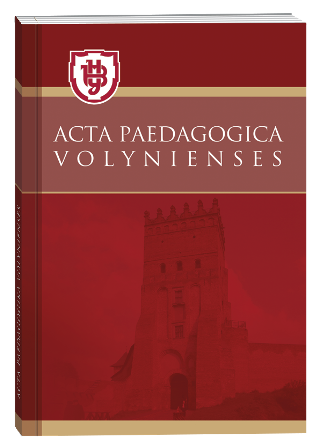FORMATION OF PRIMARY SCHOOL LEARNERS’ MEDIA LITERACY SKILLS IN THE LESSONS OF LANGUAGE AND LITERATURE BRANCH WHILE WORKING WITH MEDIA TEXTS
DOI:
https://doi.org/10.32782/apv/2022.3.9Keywords:
media literacy, media text, media product, media, language and literature educational branch, primary school learners, New Ukrainian school.Abstract
The article describes the theoretical aspects of the formation of primary school pupils’ media literacy skills, caused by the use of media in the educational space of the New Ukrainian School. The components of media literacy of primary school learners are defined and characterized: aesthetic and creative skills; interactive skills; critical analysis skills; cyber security skills. Media literacy in primary education is considered within the field of language and literature educational branch and is determined by a separate content line “Exploring media”. The authors of the syllabi (O. Savchenko and R. Shyian) reveal such a content line by acquainting junior pupils with the basics of digital literacy and forming learners’ ability to analyze, interpret, critically evaluate information in media texts, create their own media products and use them to enrich their own experience. It has been found that in the syllabi for grades 1–4 of the New Ukrainian school as the basis for the formation of primary school learners’ media literacy skills is defined the work with media texts differing from traditional texts in terms of channels of perception and their analysis through audio, visual and audiovisual media. It has been investigated that in the lessons of the language and literature educational branch the work with media texts is carried out in three ways. The first way involves the development of pupils’ speech activity (listening comprehension, reading, speaking and writing) by means of media texts. The second way covers the perception, analysis and interpretation of media texts, the development of junior pupils’ skills to find information of interest to them, describe their impressions of a media text, express their own opinion about events, phenomena and values, explain their influence on their own perception, as well as the formation of learners’ evaluative attitude towards the content and form of media texts (their real character, purpose of creation and influence on the audience). It has been proven that learners’ critical thinking skills become especially relevant when working with media texts. The third way is the creation and presentation by junior pupils of their own simple audio, visual and audiovisual media texts according to the purpose and addressee. Pedagogical conditions for the formation of primary school learners’ media literacy skills in the lessons of language and literature educational branch are set: the teacher’s readiness to introduce media education into the educational process of primary school; partnership between school and family; organization of various forms of work with media texts and their systematic use in the educational process of primary school.
References
Гудима Н., Мєлєкєсцева Н. Формування інформаційно-цифрової компетентності молодших школярів на уроках мовно-літературної галузі засобами онлайнового інструментарію навчання. Acta Paedagogica Volynienses. Луцьк : Волинський національний університет імені Лесі Українки, 2022. Вип. 2. С. 61–71.
Державний стандарт початкової освіти. Учитель початкової школи. 2018. № 4 (вкладка). С. 1–16.
Концепція впровадження медіаосвіти в Україні (нова редакція) (2016). URL: https://ms.detector.media/mediaosvita/post/16501/2016-04-27-kontseptsiya-vprovadzhennya-mediaosvity-v-ukraininova- redaktsiya/ (дата звернення: 02.07.2022).
Медіаграмотність у початковій школі: посібник для вчителя / За редакцією Волошенюк О. В., Іванова В. Ф. Київ : ЦВП, АУП, 2018. 234 с.
Нова українська школа: методика формування умінь з медіаграмотності на заняттях з предметів мовно- літературної галузі в початковій школі. Навчально-методичний посібник / І. П. Старагіна / За редакцією Волошенюк О. В., Іванова В. Ф. Київ : АУП, ЦВП, 2020. 58 с.
Нова українська школа: організація медіаосвіти в початковій школі : навчально-методичний посібник / Старагіна І. П., Волошенюк О. В., Мокрогуз О. П., Ганик О. В. Київ : ПРОПАПІР, 2021. 160 с.
Пономарьова К. І. Формування комунікативної компетентності молодших школярів у процесі навчання української мови: методичний посібник. Київ : КОНВІ ПРІНТ, 2020. 88 с.
Типові освітні програми для закладів загальної середньої освіти : 1–2 та 3–4 класи. Київ : Видавництво «Світоч», 2019. 336 с.
The Partnership for 21st Century Skills. Framework for 21st Century Learning. URL: https://www.teacherrambo. com/file.php/1/21st_century_skills.pdf (дата звернення: 30.06.2022).







